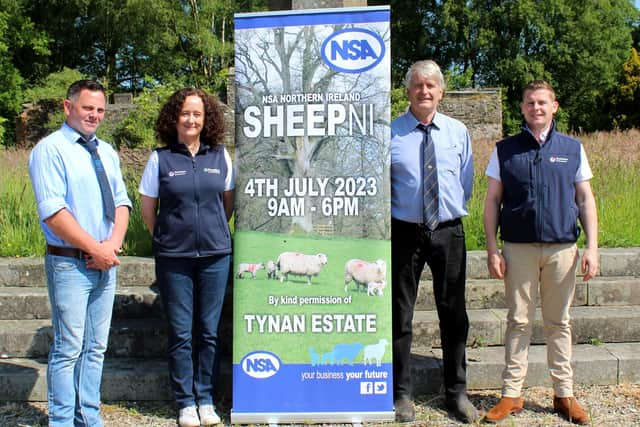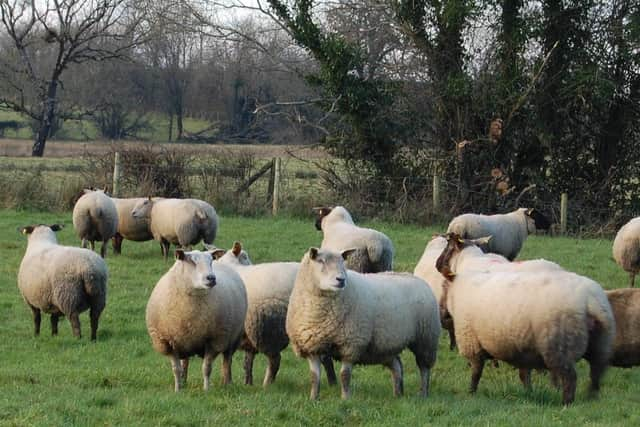Sheep will always be a good news’ story for agriculture in Northern Ireland
and live on Freeview channel 276
Yet output from the industry continues to make a vitally important contribution to the food sector and the rural economy as a whole.
Sheep tick all the boxes.
Management systems tend to be quite extensive in nature, making them good for the environment; ewes thrive where cows cannot and, of course, sheep production systems fit well within a part-time farming model.
Advertisement
Advertisement


So much for the background: adding real impetus to the fortunes of the industry at the present time is the fact that flockowners, right across Northern Ireland, are confirming excellent lamb performance rates at the present time.
It’s a very simple equation: the more lambs available for sale, the greater the likelihood of making a profit.
The core issue then becomes one of keeping all these extra animals alive.
The good news here is that farmers have full control of the factors that will allow them meet this challenge.
Advertisement
Advertisement


Either they have the management qualities to make this work for them or they don’t.
No cursing the state of international markets comes into play when it comes to honing one’s sheep husbandry skills.
Adding an extra bounce in the step of local flockowners is their continuing and direct access to the European market.
Approximately, half a million lambs are exported live from Northern Ireland to the Republic annually.
Advertisement
Advertisement
In addition, a significant proportion of our lamb meat exports are destined for the Euro zone with France the number one market in this context.
Admittedly, the sheep industry has had its ups and downs to contend with in the past. For example, it is the sector that is most vulnerable to the weather.
Most of us well remember the carnage caused by the heavy snows of March 2013 and the heavy lamb losses that ensued.
And, let’s be honest, March of this wasn’t much of a picnic for young lambs either.
Advertisement
Advertisement
Wool is another facet of sheep production that has so much potential for the future.
Talk of closer working relations across the island gives great hope for the future, specifically where wool is concerned.
However, if all goes according to plan, let’s hope that local sheep producers have a decent enough year to look back on, come the end of 2023.
And, let’s be honest, agriculture in Northern Ireland could do with a few good stories to relate over the coming months.
Sheep NI 2023
Advertisement
Advertisement
Sheep Northern Ireland (NI) comes to a true farm setting in 2023 courtesy of the event taking place at Tynan Estate in Co Armagh.
The all-important date is Tuesday, 04 July.
And what a setting it is: acres of rolling park land form the backdrop for an event that will take place both in the great outdoors and the ample sheds that are available at the venue.
All of this has been made possible with the generous support of Kate Kingan and her partner, Peter Mant , who own and manage Tynan Estate.
The land has been owned by Kate’s family for generations.
The decision was taken by the couple to bring the land that makes up the estate back within their own management a decade ago.
Advertisement
Advertisement
Prior to this the land had been let out for the previous 60 years.
Suckler cows and breeding sheep make the main farming enterprises.
This year, a total of 600 ewes were lambed at Tynan.
The overall flock is split into outdoor and indoor lambing groups.
The overall aim of the sheep enterprise is to maximise production from grazed grass.
Peter Mant takes up the story.
Advertisement
Advertisement
“The outdoor lambing group comprises 260 Romney ewes. We also lambed 340 Suffolk cross Cheviot ewes indoors.
“We have an additional 57 hoggets, which were not put to the lambs this year: they weren’t far enough on.”
He continued:“The indoor group produced 1.8 lambs per ewe on the ground: the outdoor group produced an average of 1.6 lambs per ewe.”
Lambing at Tynan Estate was pushed back to April this year.
Advertisement
Advertisement
By taking this approach the objective was to maximise grass intakes, thereby reducing the reliance on meal feeding.
Normally 70% of the lambs produced at Tynan are brought through to finishing weights. However, this figure may decrease slightly in 2023.
Peter Mant again:“The later lambing dates may not give us an opportunity to get all the lambs through to a finishing weight prior to the end of the grazing season.
“But the mart remains a very competitive outlet for those lambs that we want to sell as stores.”
Advertisement
Advertisement
Meanwhile, the weather has become the unforeseen factor to have stymied the growth rates achieved across Northern Ireland in 2023.
The drought-like conditions experienced since the beginning of May have impacted dramatically on grass growth rates.
As a consequence, ewes’ milk production levels and subsequent lamb performance have fallen back significantly.
According to Peter, this is the second year in succession that lambs have not done as well as they might otherwise could have.
Advertisement
Advertisement
“The jury is still out on what happened in 2022. The number of finished lambs that we produced was down and the kill-out grades were poorer than we would normally have expected,” he commented.
No bagged nitrogen fertiliser was spread on the sheep swards at Tynan last year.
“We only put out potash,” Peter explained.
“So, whether this had anything to do with the overall results that we obtained across the flock, I do not know.
“The weather may well have been a factor as well.
"But what I do know is that many other sheep farmers in Northern Ireland were very disappointed with the kill-out grades generated by their lambs last years.”
Advertisement
Advertisement
The decision not to spread chemical nitrogen at Tynan was taken again this year.
“We try to keep the amount of chemical fertiliser that we sow to an absolute minimum.
"The exception is the silage ground, which received two tonnes of 24: 0: 13.”
In recent years Kate and Pete have participated in the Northern Ireland Sheep Programme.
Advertisement
Advertisement
As part of this commitment, they have developed a three and five-year farm plan.
They constantly review the farm’s objectives and set key performance targets to identify areas for change.
This includes soil fertility, grassland management, breeding and genetics, health planning and performance recording, all of which will be discussed at NSA Sheep Northern Ireland.
Tynan Estate is also home to 210 cattle. This comprises a herd of 26 commercial suckler cows and followers plus 60 pedigree Dexter sucklers and calves.
Advertisement
Advertisement
All the calves born on the farm are finished as beef. An Aberdeen-Angus bull is used on the commercial sucklers.
But, in many ways, Kate and Peter view sheep as a fundamental driver for their Tynan farm.
When the decision was taken to take over the management of the land themselves, the couple set-out with 10 Suffolk ewes and 18 store cattle.
“We have built it up to what it is today on a gradual basis,” Kate commented.
Advertisement
Advertisement
“In many ways the sheep reflect my own New Zealand heritage. They have always been a fundamental part of our farm develop plan."
The flock breeding ewes and lambs play a fundamental part in helping to manage the 240 acres that make up the park land at Tynan estate.
This is an area of special scientific interest (ASSI), which must be managed in a very specific manner.
“We cannot extensively farm this land: it is part of an extensive programme,” said Peter.
Advertisement
Advertisement
“The grassland swards must be managed in a specific way. But they are very suited to sheep.
“Ironically, we have tried to finish weaned lambs on the re-seeded swards on the periphery of the estate.
“But we have found in the past that the new grasses just run through the sheep. And in some cases, we have had to return some lambs to the older pastures.”
Sheep will be maintained as an important element of the farming mix at Tynan estate.
Advertisement
Advertisement
In fact, Kate and Peter would be keen to expand sheep numbers, if they had enough winter grazing.
“Grass availability is in surplus during the spring and summer months. But it does become an issue, once we get into January,” Peter confirmed.
He concluded: “If we could rent winter grazing ground in the Tynan area then upping our sheep numbers becomes a real possibility.”
National Sheep Association
Meanwhile, the National Sheep Association (NSA) is confirming that plans are well advanced for its 2023 Sheep NI event.
Advertisement
Advertisement
Edward Adamson is the NSA’s regional representative in Northern Ireland.
He commented:“Sheep Northern Ireland was last held in 2019. However, this is the first time that the event has been hosted on farm.
“The sheep sector has a tremendous amount to offer Northern Ireland’s economy as a whole.
"Our event is taking place against the backdrop of improving producer prices. This follows a slight market downturn earlier in the year.”
Advertisement
Advertisement
Edward continued:“But given the scale of rising costs, flockowners need every penny they can get right now.
“I would like to encourage all sheep farmers to visit Tynan Estate on July 4th. There will be something for everyone to learn and discuss on the day.”
Visitors will have the opportunity to see and compare a wide range of sheep breeds, suitable for both hill and lowland production, while an excellent entry of trade stands will bring together examples of just about everything the sheep farmer could need.
This biennial event provides a platform for the industry representatives, breed societies, breeders and companies to assemble and display their products at a single devoted venue. Organisers cannot really speak about SheepNI without mentioning the sponsors and their support which allows the event to take place. Longstanding supporters of the event Topflock, Shearwell, Dunbia and Ulster Wools are joined by first time sponsors Bluefaced Leicester Sheep, Irish Farmers Journal, TePari and Provita.
Advertisement
Advertisement
Sheep Northern Ireland also takes place against the backdrop of calls for greater support being made available to the sheep sector.
This was an issue recently addressed by Ulster Wool director Brendan Kelly. He said:
He commented:“There are no specific support proposals for sheep within the package of post-Brexit support measures identified by former farm minister Edwin Poots.
“This is fundamentally wrong. We are already seeing farmers leaving the sector and I fear this trend will gather further momentum during the period ahead.”
Advertisement
Advertisement
Kelly is also concerned about the age profile of farmers within the sheep industry.
“There are no young people coming into the industry. And many of those working with sheep now will be retiring in the near future.”
Kelly believes that the introduction of a sheep welfare payment system, similar to that already operating in the Republic of Ireland, could deliver much-needed financial support for sheep farmers, north of the border.
“An annual payment in the region of £12/ewe would make all the difference in this regard,” he said.
Advertisement
Advertisement
“I am fully aware of the fact that the Ulster Farmers’ Union has already met with Department of Agriculture, Environment and Rural Affairs officials on these matters. At the end of the day, this all comes down to budgets. However, where sheep are concerned, the need for money to future proof the sector is acute. And the clock is ticking.”